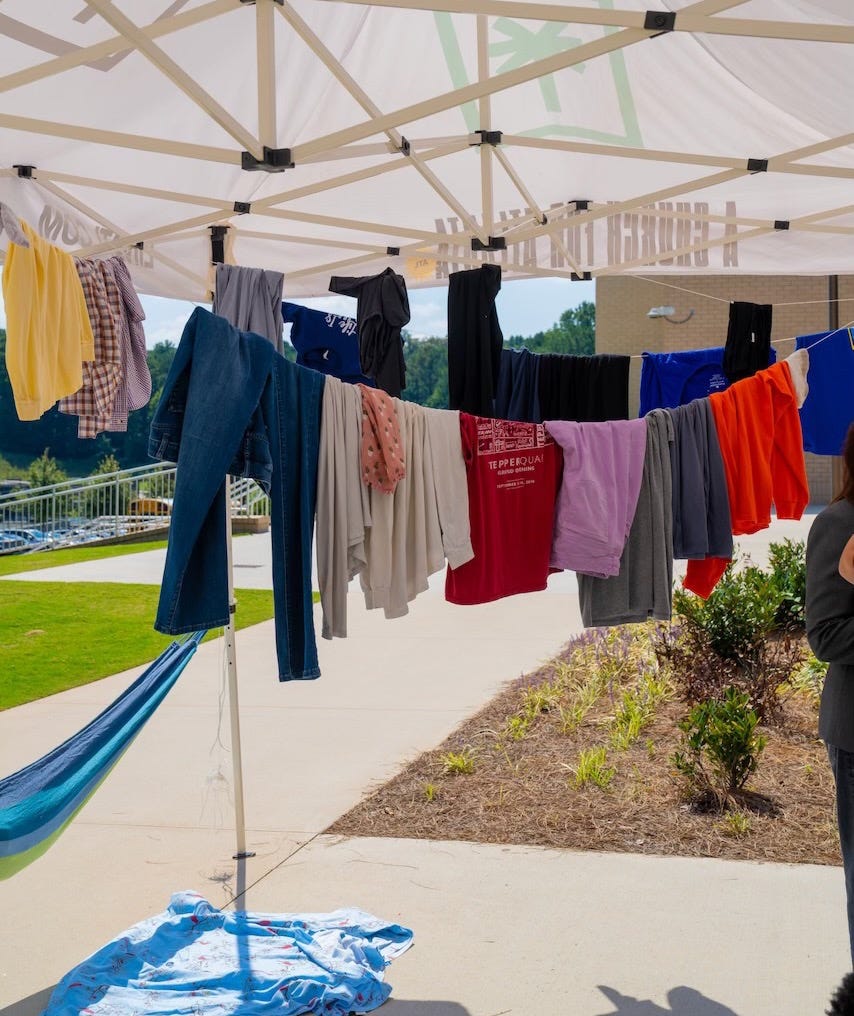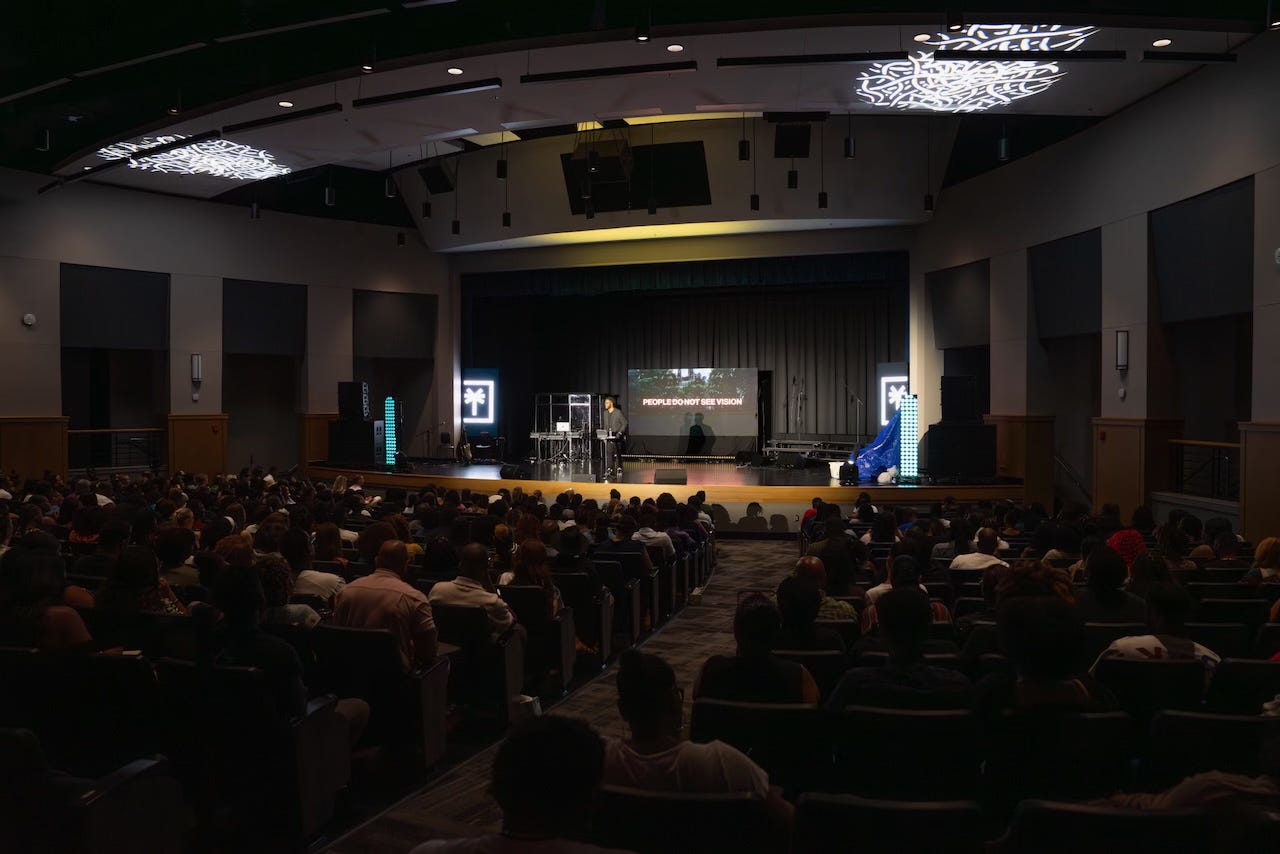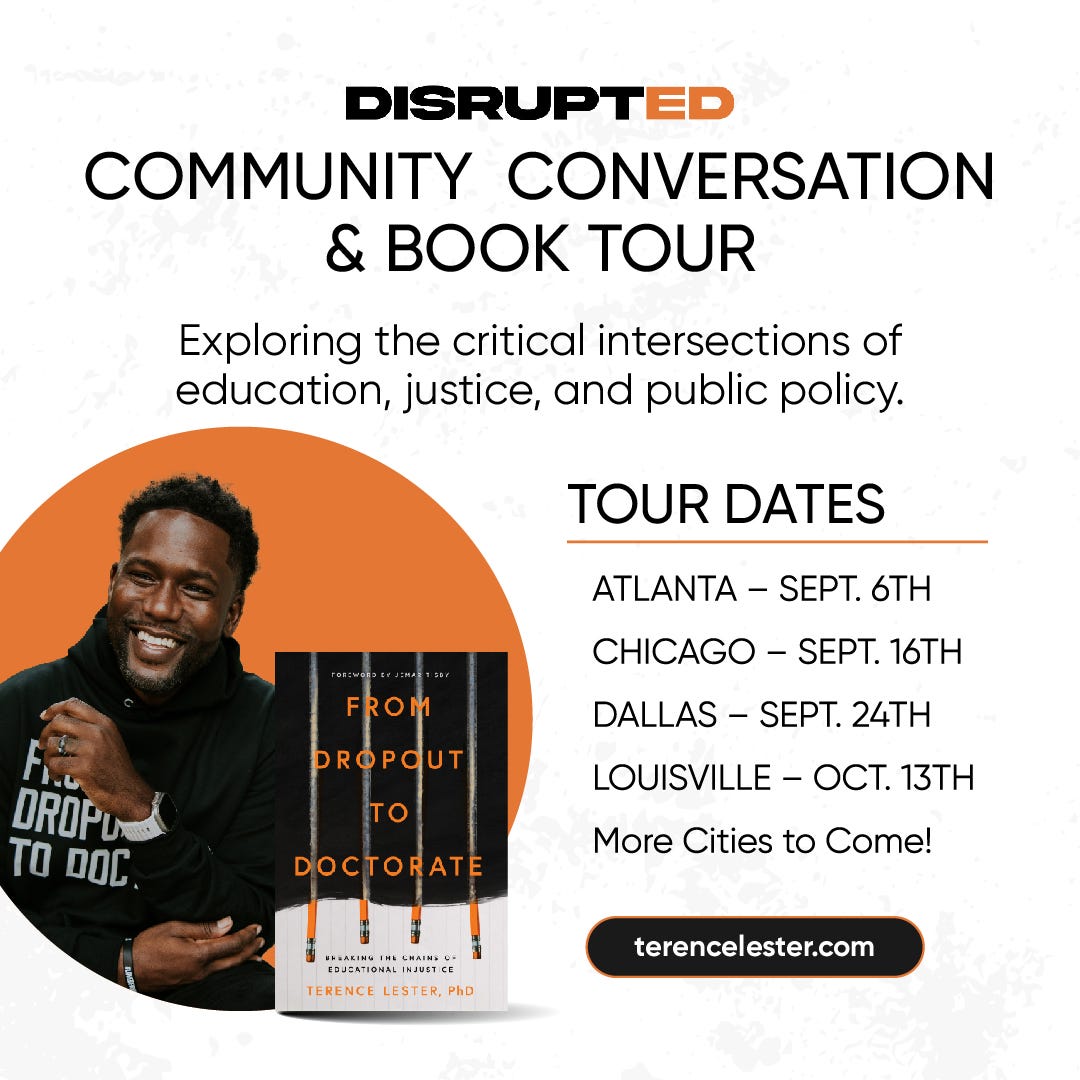This past weekend, I got a chance to speak at a church1 here in Atlanta, and to be honest it was my first message I have delivered in a church space since losing my father last year. Not because I have not wanted to, but because I took time to honor my grief and learn to process it, knowing the last message I gave was his eulogy.
Sure, I have spoken in many other places, but not in communities of faith.
This church gave me the space to talk about the crisis of homelessness, especially student homelessness, my own story, and the journey I’ve been on. I also had the chance to partner with this community to create visual representations of homelessness, using encampments to remind everyone that beyond the four walls there are people in deep need of love.

As always, I spoke from my heart, but what moved me the most was the young lady that came up to me afterwards. She shared her story about going to sleep one night and waking up paralyzed, how she fought to gain some sense of function but now lives with a disability while living out of her car and not being able to work because of what happened to her out of the blue.
I will never forget the pain in her eyes and also how I was able to connect her with some others in the community that wanted to help her get resources and stability.
In the car ride, I shed a few tears. Call me an empath, or whatever you want, but I was reminded that I just care about people.
I care about people who are suffering because I know what it has been like to suffer. I care about people who are isolated because I know what it feels like to be isolated. I care about people's stories because every single person has a story that is deserving of acknowledgement and the affirming of their dignity.
It got me thinking that we are at a crucial time and people are still battling compassion fatigue, overall tiredness from what is happening in the social landscape, but most importantly, what may be happening personally. All of that together creates the type of distance where it causes people to be less compassionate.
The season of isolation that began during COVID revealed how fragile our sense of connection already was. Even though the pandemic has passed, the patterns of loneliness, disconnection, and social fragmentation remain.
The U.S. Surgeon General recently named loneliness and isolation a public health crisis, pointing out that being disconnected can increase depression, anxiety, and even mortality.2 This disconnection creates the conditions for what psychologists call compassion fatigue, a state where the constant weight of crises, combined with personal exhaustion, dulls our ability to care. Compassion fatigue doesn’t mean people stop caring altogether, but it does mean they can become numb, withdrawn, or overwhelmed.
That is why I hold on to the practices that keep compassion alive. For me, there are three and one more that grounds them all.
First, gratitude. But not in the cliché sense. I am reminded by each person I encounter that not only do we have small things to be grateful for, but I am grateful that I get to remind people that they are worthy and worth it.
The practice of gratitude has reminded me to stay in the present moment which is very easy to lose to overwhelm, schedules, and just being all consumed with what is not going right and it has helped me to maintain compassion towards what is present in my life, especially encountering people who need to be reminded they are not alone. Why? Because I am grateful for the many people who have reminded me of the same and I want to share that everywhere I go and, in the moments, I get to connect with people who need hope.
Second, stories. Every time I get a chance to be impacted by someone else's story, I am reminded that there are so many more stories in the world that are deserving of attention, love, and compassion.
Over the years, I have met people who have journeyed through the hardest circumstances, and being proximate has always reminded me of my purpose and why I give my life to a lifestyle of compassion.
Stories have the power to draw people out of apathy and keep them from turning away, which is so easy to do these days. Stories remind me that no one is invisible, and that the fight for love, justice, and dignity is always personal.
Third, serving. One of the least googled leadership styles is servant leadership, but it is also one of the only leadership styles that has ever changed the world.
And I agree with Dr. Martin Luther King Jr. when he said: “Everybody can be great, because everybody can serve. You don’t have to have a college degree to serve. You don’t have to make your subject and verb agree to serve. You only need a heart full of grace. A soul generated by love.”3
Serving has given my life meaning and brings me joy. To lend a hand, a voice, listen to a story, and try to figure out the best way to support others is not a weak thing to do, it is a life-changing thing to do.
Serving pulls me out of isolation and into connection, and that connection is what sustains compassion when the world feels overwhelming.
And if I can add one more, faith.
My faith roots me in the belief that compassion is not optional; it is central to what it means to live a life of love. Faith has carried me through grief, walked with me through the hardest moments of my life, and has kept joy nearby when sorrow was present, and reminds me that compassion always has a purpose whether it is for ourselves or others.
It is what calls us to show up for others, even on the days when we don’t feel like we have much to give. What is keeping your compassion in place these days?
For me, it’s never forgetting that serving and being present with others is what brings me joy.
DisruptED Tour
I’m excited to share that I’ll be in a few cities soon, talking about what it means to show up and serve communities facing homelessness, poverty, and deep need—while also sharing my story along the way.
Atlanta — Sept. 6th → RSVP Here
Chicago — Sept. 16th → RSVP Here
Dallas — Sept. 24th → RSVP Here
Louisville — Oct. 13th → RSVP Here
If you’re looking for a way to get involved:
Show up in person to support the book launch and students in Atlanta.
Donate to Zion’s Closet and every item goes straight to students and helps us serve hundreds of children in a single school.
Volunteer by signing up to serve with Love Beyond Walls if you are in Atlanta.
Preorder the book and share it with someone who cares about students (6 days away).
And if nothing else—send prayers and positivity as we continue to do this work.
Book Dr. Lester to Speak [HERE]
Listen to the Imgaine Dignity Podcast [HERE]
LIIV Atlanta. “Sowing Seeds of Redemption and Transformation.” Instagram Reel, August 31, 2025. Accessed September 3, 2025. https://www.instagram.com/liivatl/reel/DOClG2HkVq3/.
Office of the Surgeon General. Our Epidemic of Loneliness and Isolation: The U.S. Surgeon General’s Advisory on the Healing Effects of Social Connection and Community. Washington, DC: U.S. Department of Health and Human Services, 2023.
King, Martin Luther, Jr. The Drum Major Instinct. Sermon, Ebenezer Baptist Church, Atlanta, GA, February 4, 1968. In A Knock at Midnight: Inspiration from the Great Sermons of Reverend Martin Luther King, Jr., edited by Clayborne Carson and Peter Holloran, 163–174. New York: Warner Books, 1998.




💕💕💕💕💕
Any time coming to Florida? Orlando?